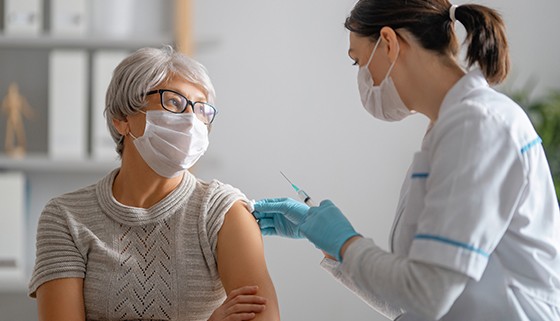By Emily Caulkett-
A UKHSA backed study has revealed its findings on the protection provided against COVID- 19 infection in those who have had 2 doses of the vaccine, as well as those who have previously been infected with COVID-19.
It reveals a significant short-term protection against infection among those who had not had a previous infection , but states that the protection wanes significantly after 6 months.
An analysis was also carried out on participants, both unvaccinated and vaccinated, who had been previously infected with COVID-19.
Unvaccinated participants who had been previously infected with COVID-19 were found to have 86% reduced risk of reinfection, when compared to the risk of primary infection in those who had no previous infection and were also unvaccinated. This degree of protection was found to weaken to 69% after a year.
Dual protection in people who had been previously infected and subsequently double vaccinated was even greater and more durable, standing at over 90% after 2 doses. This protection remained strong over a year after infection and over 6 months following vaccination.
Susan Hopkins, SIREN study lead and Chief Medical Advisor at the UK Health Security Agency (UKHSA), said:
‘This research demonstrates why it is crucial to get vaccinated, as it provides a significantly greater level of protection against infection from COVID-19, whether or not you have been previously infected.
However, the analysis also clearly shows that this protection from just 2 doses wanes significantly within months, which is why the rollout of booster jabs has been an instrumental part of our efforts to contain COVID-19.
To avoid infection and illness, it is vital that everyone eligible takes up the offer of a booster as soon as it is offered.
Vaccine effectiveness for Pfizer, where the second dose was administered 6 weeks or more after the first dose, stood at 85% from 14 to 73 days after, falling to 51% after 6 months.
Vaccine effectiveness for 2 doses of Pfizer, where both doses were administered within 6 weeks of each other, stood at 89% 14 to 73 days after dose 2, decreasing to 53% after 6 months.
The fact the level of protection offered by the vaccine reduces with time, raises questions about the fuss surrounding stringent laws preventing access to public or recreational venues.
However, some experts argue that reduced levels of protection within certain time frameworks still minimizes the chance of spreading the virus and increases overall safety. Maximizing safety of the population lies at the heart of the vaccination drive and tough laws in various countries are reportedly to preserve those ends.
The problem is the fact that many cases have been highlighted in which double vaccinated people still caught the virus and in some cases were hospitalized. This makes probability levels of protection irrelevant to members of the public, once they know double vaccinated individuals and those with the booster can still get the virus.
Higher protection from the virus is still seen to make a significant difference in terms of the overall safety levels being double vaccinated to the population even where the chances of becoming infected after being vaccination reduces with time.
Increased levels of protection is still not seen by a large proportion of the public as a good reason to deprive unvaccinated people from common privileges in any society.
Many scientists hold the view that the higher the level of protection provided by vaccination, the higher the importance of becoming vaccinated.




